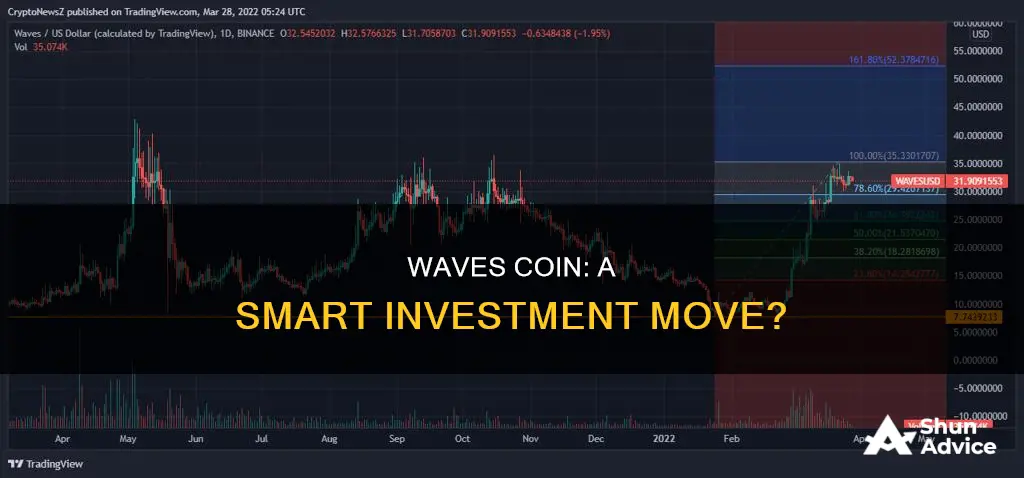
Waves (WAVES) is a multi-purpose blockchain platform that supports decentralized applications (DApps) and smart contracts. It was launched in June 2016 by Ukrainian-born scientist Alexander Ivanov, also known as Sasha Ivanov. The platform aims to enhance the functionality, speed, and user-friendliness of blockchain technology. The native token of the platform is WAVES, which is primarily used for standard payments such as block rewards. At the time of writing, the live Waves price is $1.10 USD, with a 24-hour trading volume of $41,486,752 USD. In this paragraph, we will explore whether it is worth investing in the Waves coin.
What You'll Learn

Waves' blockchain technology and its potential for customisation
The Waves blockchain platform has been designed with simplicity and efficiency in mind, aiming to make blockchain technology accessible to everyone. It offers a range of user-friendly tools and interfaces that cater to both experienced blockchain users and newcomers. This focus on accessibility has contributed to its popularity, particularly among non-technical users.
One of Waves' standout features is the Waves-NG protocol, which enables high-speed transactions and low fees. This sets it apart from other blockchain platforms like Ethereum and Bitcoin, which are known for their robustness but can be less accessible. Waves also prioritises security, implementing rigorous security measures and audits to safeguard user assets and foster trust within the community.
The Waves platform offers a native cryptocurrency, also called WAVES, which serves various purposes within the ecosystem. Users can utilise WAVES for transaction fees, token creation, and staking, which is essential for network security. Additionally, Waves has developed its own smart contract language, RIDE, which simplifies the creation of decentralised applications (DApps). This empowers developers to build complex applications without the steep learning curve typically associated with other blockchain networks.
The Waves Decentralized Exchange (DEX) is a vital component of the ecosystem, providing secure and fast trading of various tokens. By allowing users to retain control of their assets, the DEX reduces counterparty risk. Waves also enables the tokenization of physical and digital assets, creating new opportunities for fractional ownership and efficient asset management. This innovation has the potential to transform industries such as real estate, art, and finance.
Waves provides a powerful blockchain-agnostic ecosystem, with a focus on inter-chain DeFi and technological freedom for blockchain-based finance. It offers innovative tools for system adjustment and monitoring, as well as confidential data exchange between authorised participants. Waves aspires to maximise the potential of blockchain technology while minimising its carbon footprint.
Apple's Bitcoin Investment: Did it Happen?
You may want to see also

The Waves token and its value
Waves is a multi-purpose blockchain platform that supports various use cases, including decentralized applications (DApps) and smart contracts. The platform was launched in June 2016 following one of the cryptocurrency industry's earliest initial coin offerings (ICO). Waves was founded by Ukrainian-born scientist Alexander Ivanov, also known as Sasha Ivanov.
The Waves native token, WAVES, is an uncapped supply token used for standard payments such as block rewards. The token initially had a fixed cap of 100 million tokens available, 85% of which went to sale participants, 4% to partners and supporters, 9% to developers, and 1% each to early supporters and bounty schemes. However, in 2019, it was decided to remove the supply cap, with decision-making transferred to network participants. The current block reward is 6 WAVES, and any changes come in the form of votes, where users decide whether or not to decrease the block reward by 0.5 WAVES every 110,000 blocks.
WAVES, as a cryptocurrency, has been on the market for over four years and is widely tradable on a large number of exchanges. Binance and Huobi Global are among the largest market venues for trading WAVES. The live Waves price as of August 2024 is $1.10 USD, with a 24-hour trading volume of $41,486,752 USD. The current CoinMarketCap ranking is #273, with a live market cap of $126,503,626 USD.
Waves has several features that make it a unique and attractive investment opportunity. Firstly, it was one of the first offerings in its field, aiming to improve on early blockchain platforms by increasing speed, utility, and user-friendliness. Secondly, Waves has a good decentralized exchange (DAX) that is still in development, with Fiat integration in the works. This is particularly appealing to the crypto world, which has experienced issues with centralized exchanges. Additionally, Waves allows users to lease their tokens and earn interest, as well as receive airdrops when holding or leasing their tokens.
A Beginner's Guide: Investing in Bitcoin in Japan
You may want to see also

The Waves platform's interoperability with Ethereum
The Waves platform is a multi-purpose blockchain platform that supports decentralised applications and smart contracts. It was launched in 2016 to improve on the first blockchain platforms by increasing speed, utility, and user-friendliness.
In 2020, Waves announced that its platform would be interoperable with the Ethereum network by releasing the WAVES token as an ERC-20 standard asset. This means that Waves holders can access decentralised applications, exchanges, and DeFi protocols operating on the Ethereum blockchain. In turn, Ethereum users will gain easy access to the Waves token. This interoperability will also allow Waves pools to become available on Ethereum-based decentralised exchanges such as Uniswap, Mooniswap, and Curve.
The Waves-Ethereum gateway is available through the Waves.Exchange interface. To issue one ERC-20 WAVES, users must lock one WAVES on the Waves blockchain. It is also possible to convert tokens from Ethereum back to Waves.
The interoperability between the two networks is made possible through Gravity, a data protocol that connects different blockchains. The Waves team also plans to implement the option of staking WAVES tokens directly from Ethereum wallets.
Sasha Ivanov, the founder of the Waves platform, highlighted the benefits of this interoperability:
> "Ethereum is the leading blockchain by the number of dApp users. The emergence of the WAVES token in ERC-20 format provides new opportunities for interaction between the two ecosystems. Some tokens on the Waves blockchain have already been accessible in the Ethereum network for a couple of months, and we see a growing demand for them. This is an example of working cross-chain interoperability which has been so much discussed recently."
Bitcoin Investment: Your Guide to Getting Rich
You may want to see also

The pros and cons of the Waves blockchain
The Waves blockchain is a multi-purpose platform that supports decentralised applications (DApps) and smart contracts. It was launched in 2016 by Ukrainian-born scientist Alexander Ivanov, also known as Sasha Ivanov, and has since undergone various changes and added new spin-off features.
Pros of the Waves blockchain:
- Decentralised exchange (DEX): The Waves wallet comes with a decentralised exchange, which allows users to create and trade tokens independently. This reduces the risk of a centralised system, such as security issues and user freedom.
- Location and partnerships: Being a Russian invention, the Waves blockchain has secured partnerships with prominent Russian organisations, including international consulting firm Deloitte and Russia's Central Securities Depository. It has also partnered with Russian Burger King to create the Whoppercoin.
- Environmentally friendly: Unlike most traditional cryptocurrency projects, Waves does not rely on the Proof of Work system, which requires miners and is taxing on the environment. Instead, it uses a unique Leased Proof of Stake system, which allows users to stake their Waves coins and get returns while helping the environment.
- User-friendly: Waves allows users to quickly and easily create their own customised tokens, which can be useful for launching new projects, crowdfunding, or building a loyalty rewards program.
- Fiat money gateways: Users can use fiat money to buy tokens on the Waves exchange.
- Good DEX pairing: The Waves platform offers advanced trading pairs, providing solid trading options for users.
Cons of the Waves blockchain:
- User interface: The Waves platform's user interface has been criticised for being difficult to navigate and lacking visual appeal. However, this can be improved over time.
- Security concerns: There are concerns about the security of the Waves network, as users cannot store their Waves tokens on most hardware wallets available in the market. Additionally, there is a lack of two-factor authentication.
- Lack of visibility: Waves is not available for trading on major crypto exchanges, except for YoBit and Bittrex, which limits its visibility in the crypto trade market. However, the company is reportedly planning to list on major exchanges in the future.
- Competition: Waves faces competition from established players like Ethereum and NEO in the crowdfunding and ICO space, which is one of its fundamental use cases.
Overall, the Waves blockchain has unique features and partnerships that position it well in the crypto and blockchain space. However, it also faces some challenges, particularly around security, user experience, and competition.
A Guide to Investing in Bitcoin in Zimbabwe
You may want to see also

The future of Waves and its potential for growth
Blockchain Innovation and Promise: Waves is a blockchain company known for its innovation and potential. It aims to address the challenges of centralize exchanges like Poloniex and Coinbase by offering a good decentralized exchange (DAX). The Waves DEX is one of the fastest decentralized cryptocurrency exchanges globally, enabling users to trade Waves-based tokens swiftly.
Leased Proof-of-Stake (LPoS) Mechanism: Waves employs a hybrid consensus mechanism, the LPoS, which combines the best aspects of Proof-of-Stake (PoS) networks with new protocols. This mechanism allows users to stake tokens by leasing them to full nodes running the network, enhancing network security.
Custom Application Tokens (CATs): At the core of the Waves platform are CATs, which are basic user tokens that anyone can create directly through the lite client. Users can launch, distribute, and trade their crypto within minutes, making Waves ideal for crowdfunding, ICOs, and loyalty programs.
Zero-Fee Structure for Developers: Unlike Ethereum, Waves eliminates gas fees, which can be costly for developers, and replaces them with a minimal flat fee. This makes it more affordable for developers to create and deploy decentralized applications (DApps) and smart contracts on the Waves platform.
Interoperability with Ethereum: In 2020, Waves announced interoperability with the Ethereum network by releasing the WAVES token as an ERC-20 standard asset. This interoperability broadens the potential use cases for WAVES tokens and enhances their accessibility.
Expanding Use Cases: Waves caters to business clients seeking to leverage blockchain technology to improve processes or create new services. The platform supports smart contract and DApp development, providing a foundation for businesses to build blockchain-based applications. Additionally, Waves has introduced Gravity, a cross-chain and oracle network, and Neutrino, a decentralized finance (DeFi) platform, expanding its use cases further.
Long-Term Vision and Track Record: The Waves developers are focused on the future, recognizing the potential of tokenization as one of the fastest-growing sectors in the market. Waves has consistently introduced innovative features and provided helpful blockchain services to the masses, ensuring its position as a top player in the market.
In conclusion, Waves has a bright future ahead with its unique features, expanding use cases, and focus on innovation. Its potential for growth is significant, especially with its interoperability with Ethereum and the continuous development of its blockchain platform.
Investopedia's Guide to Investing in Bitcoin
You may want to see also
Frequently asked questions
Waves is a multi-purpose blockchain platform that supports various use cases, including decentralized applications (DApps) and smart contracts. It was launched in June 2016 and is headed by Ukrainian-born scientist Alexander Ivanov.
The Waves token (WAVES) is the platform's native token, primarily used for standard payments such as block rewards.
Waves has a good decentralised exchange (DAX) and allows users to lease their Waves and earn interest. It also offers official and unofficial airdrops, where you can get Waves go tokens and Waves community tokens. Additionally, Waves enables anyone to create and launch custom crypto tokens without any prior understanding of the technology, removing technical barriers from the token creation process.
The current price of Waves is $1.10-$1.23 USD. Its all-time high was $62.36.
Waves is widely tradable and can be purchased on various exchanges, including Bybit, DigiFinex, Bitget, BloFin, BTCC, Kraken, KuCoin, and WazirX.







